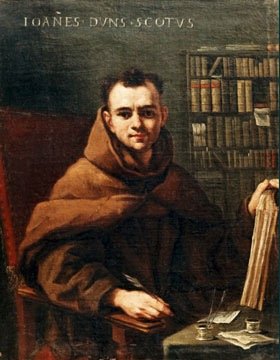Blessed John Duns Scotus
Dates: 1265? - 1308
John was born in Duns in the Scottish Borders, in late 1265 or early 1266. His name signifies that he was John, the Scot from Duns.He was the son of Ninian of Duns. Educated initially in the monastic abbeys of Melrose and Dryburgh, at 13 he began to study at the friary school in Haddington in Berwickshire. His paternal uncle Elias of Duns was elected Custos of Newcastle, which Custody contained all of Scotland, in 1278. At 15, John was admitted to the Order in Dumfries by his uncle, although he was below the canonical age of 18.
Tradition recounts that on Christmas night in 1281, while he was preparing for his religious profession, he had a vision of the Child Jesus appearing in his arms, reflecting and firing his love for Jesus and his Blessed Mother. Having finished his studies, he was ordained a priest at the age of 25, on 17th March 1291 by Oliver Sutton, the Bishop of Lincoln in the Church of St. Andrew in Northampton. He was soon given the faculties to hear confession, which at that time were not given automatically but were reserved to those trusted for their sound doctrine and good advice.
He went on to study in Oxford and then Paris and should have received his promotion as Regent Master in 1303 but was prevented from doing so because he supported Pope Boniface VIII in his conflict with King Philip the Fair of France. John's name is 19th on the list of “non-appellants” who took the Pope's side. He left Paris until the death of Pope Boniface tempered the dispute between the French monarch and the Papacy.
In November 1304 Gonsalvo of Spain, John's former teacher, wrote recommending him to the Friars in Paris. He was received back to studies and on 26th March 1305 became Regent Master of the Franciscan school at the university of Paris. Here he constructed his Christocentric theology in which the incarnation of the Word is presented as the highest of God's works (summum opus Dei), willed from the beginning of creation, rather than as a remedy for sin. His defence of the doctrine of the Immaculate Conception of Mary, is a consequence of this central position of Christ in creation. For Christ to be the perfect mediator of redemption, he must have mediated that redemption perfectly to at least one person. Indeed he did, to his Mother, whom he protected from all stain of sin, even original sin, since it is more perfect to protect from sin altogether than it is to free from sin after it has been contracted. This doctrine he defended in Paris in the first months of 1307.
In July that year he left Paris for Cologne in order to reorganise the Friars' studium there and to combat heresy. His febrile pace of work left him weak and vulnerable to the disease to which he succumbed on 8th November 1308, just 43 years old. Pope John Paul II confirmed the cult of Blessed John Duns Scotus on 20th March 1993. [1]
[1] F. Bracci and A. Pozzebon. Frati Minori Santi e Beati. Rome: Postulazione Generale Ordine dei Frati Minori, 2009. p. 101 – 105.

Memorial Day: 8th November
